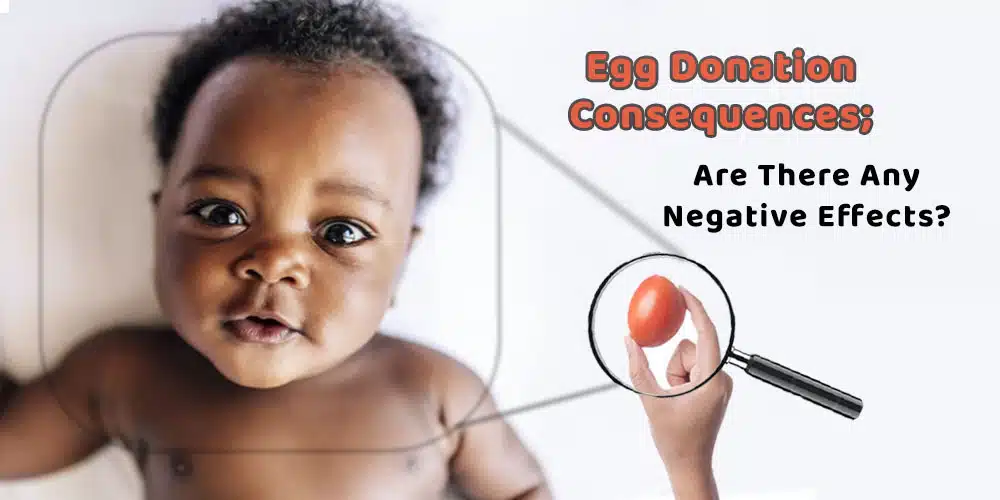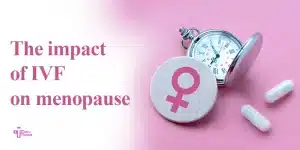- It can be a stressful and challenging process that requires more patience than you might think.
- It may result in permanent physical changes.
- It might lead to a personal pregnancy.
Consequences of egg donation
Researchers in last decades have been focused on identifying any potential health risks associated with hormonal treatment and egg retrieval, including the long-term effects of egg donation process, including side effects on the egg donor’s fertility, chronic diseases, and cancers.
You should mention this vital point that as the existing articles do not cover a sizeable statistical population, they could not be reliable; in other words, they still need to provide a valid document and reliable evidence to accuse egg donation. However, people who want to donate their eggs have asked FAQ questions over the years, so in this blog post on TebMedTourism, we will give them up-to-date and correct answers in detail to the following questions:
- Can egg donation cause early menopause?
- Can egg donation cause cancer?
- Will egg donation affect future fertility?
- What are the long-term side effects of egg donation?
- Does donating eggs hurt your fertility?
Can egg donation cause early menopause?
Suppose you had been an egg donor, and now your period has stopped; Is it meaningful to be suspicious to egg donation consequences, or ask yourself is it one of the egg donation side effects? Before answering this question, it is better to ask, “what causes early menopause?”.
A simple reply to this query from WHO is: “A biopsychosocial phenomenon that naturally will happen in a woman’s life and because of that she turns from fertile to infertile, called menopause.” the leading cause of menopause is a natural decrease in reproductive hormones. So based on these definitions, if a woman under 45 experience menopause, such a situation is called early menopause.
It means that women’s bodies couldn’t make enough estrogen and progestin responsible for regulating menstruation. Now the critical question is: Which step of egg donation could be responsible for early menopause? A quick review of the stages of egg donation is helpful.
A quick review to Egg donation
A few steps are in front of you when you decide to be an egg donor. From matching and screening an egg donor to the egg retrieval step, it can take anywhere from two to three months on average. Selecting a donor egg and finding an ideal donor egg can be intimidating, but fortunately, a good database of egg donors will help you find the right match.
Evaluation of the donor’s psychological condition and genetic risk includes reviewing the donor’s profile and medical records, a physical examination, and a specific ultrasound of the donor’s ovaries. Comprehensive blood tests, including an infectious panel and genetic screening, and a urine drug screen.
So after medical, physical and psychological approval of specialists of the agency to each potential donor, It’s time to enter ovarian stimulation and egg retrieval, overall called egg retrieval stimulation. The cycle of egg retrieval stimulation consists of injections and trigger shots starts from 2nd days of a woman’s natural menstrual cycle.
These medications put you on stims before egg retrieval starts, which takes about 10 to 14 days on average. According to some researches, receiving hormonal medicines via egg retrieval stimulation in an egg donation procedure could active some bad guys in your DNA! So following FAQ questions about egg donation consequences will arise, and we want to answer the questions below with high accuracy so that you can enter the process safely and without fear of egg donation risks!
So who’s responsible of early menopause?
Two main reasons are responsible for early menopause, insufficient hormones and low ovarian reserve. As you see in the previous paragraph, egg donation is full of hormonal injections and medications, so insufficient hormones via donating eggs will be eliminated.
But about low ovarian reserve, we have to discuss a little more. At the time of puberty, approximately 450,000 eggs are present in the ovaries. During the woman’s reproductive years, only 400–500 of these will develop to the point of ovulation. Between puberty and menopause, the remaining eggs are gradually absorbed by the body and do not mature.
There is no evidence that the use of fertility medications or egg donation will reduce egg reserves to the point where they will cause premature menopause due to a large number of these “spare” eggs. So the answer to the question, “If I donate some of my eggs, will I enter menopause earlier?” is a definite No!
Can egg donation cause cancer?
The answer to this question depends on the quantity of egg donation process. For example, more than three times, according to articles, could be harmful. Because receiving more Hormonal injections, may cause hormonal imbalance in your body!
Some articles say IVF hormone Therapy could accelerate women’s cancer, and others state: “Statically, there isn’t any significant increase in ovarian and breast cancers!
As you see consequences of egg donation are very controversial issues that, according to the opinions of scientists, may take decades to emerge health effects of egg donation. Only the result of one research published on Elsevier shows that one of the long-term side effects of egg donation for five young egg donors without any genetic history of breast cancer in their 30s had experienced breast cancer.
Due to this small statistical population and insufficient data, we can say there is no strong evidence that donating eggs could cause cancer.
Will egg donation affect future fertility?
Most egg donor banks desire to choose young mothers who have at least one healthy kid. Some of these mothers that would like to be an egg donors are anxious about their fertility and the consequences of egg donation. They ask their fertility doctor:
“Can egg donation affect my child if I wanted to have a baby in the future?” Or they ask nervously! “Is it possible that donating eggs affect my fertility?” Fortunately, the answer to all the above questions is negative; only a tiny portion of an egg donor’s ovarian reserve is required for egg donation. Meanwhile, we want to remind you of a crucial fact. During the egg retrieval procedure, a fertility specialist will take some eggs without affecting the other eggs or dyeing them!
So, if you trust on our company and consider our policy that allows donating eggs up to three times, we will give you the excellent news that egg donation will not affect your future fertility.
What are the long term side effects of egg donation?
For decades, researchers have not been able to identify potential long-term health risks associated with egg retrieval procedures and hormonal treatment. According to some controversial ideas, the effects on fertility, chronic diseases, and cancers are all examples of the long-term effects of egg donation.
Still, in reality, no authentic evidence could approve that egg donors will experience such long-term effects in future. Some issues like unwanted pregnancy, OHSS, experiencing stressful conditions, etc. are not long-term complications. Ovarian Hyperstimulation Syndrome, also known as OHSS, is a condition in which a patient can experience abdominal pain, nausea, vomiting, diarrhea, and bloating if too many hormones are released during the egg retrieval process.
This is the only side effect of egg donation, which can be prevented with timely and post-operation care (including a special diet that is high in protein and high sodium also consuming electrolyte-rich fluids), which are not long-term at all and subside after a few days.
Does donating eggs hurt your fertility, now?
It is your body; it needs healthy foods, a healthy diet and exercise; it can’t bear overdosing on hormones. If you are considering your fertility after donating eggs, special focus is necessary on a number of egg donation experiences. For instance, TebMedTourism’s policy regarding egg donors is to donate only three times in an egg donor’s life.
The health of egg donors is important to us. If an egg donor insists on donating an egg more than three, we don’t accept such a wrong decision and will remind her of the consequences of egg donation that could endanger her health. One of the most powerful data that shows donating an egg could not hurt your fertility is the most common issue via the egg donation process, personal pregnancy.
Due to the egg retrieval stimulation steps and producing more eggs and hormones, the pregnancy of the egg donor is possible. So before this step, necessary reminders are given to the egg donor about not having sex during the egg donation procedure to prevent such side effects!
Learn more:All about Egg donation in Iran















